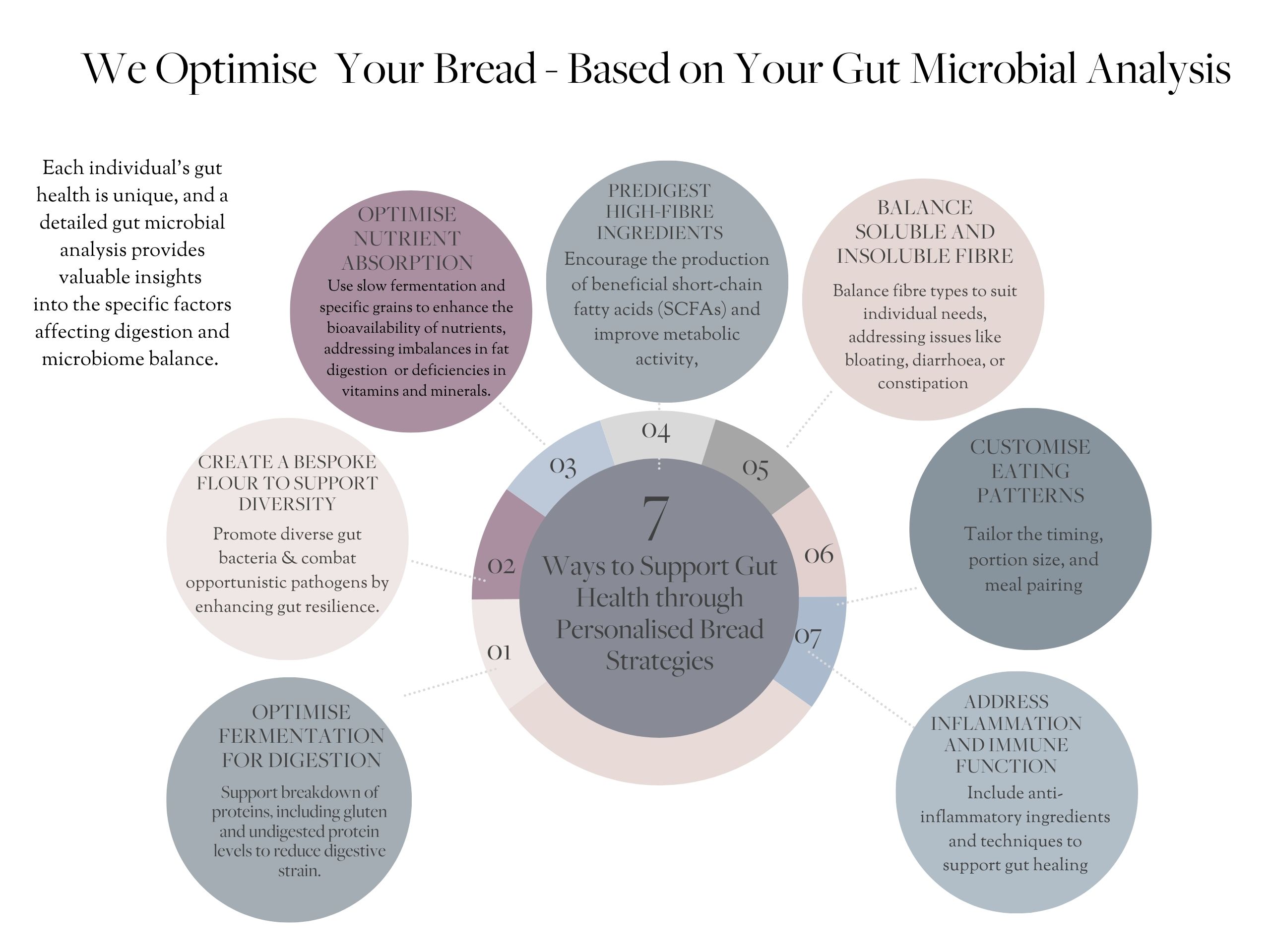Could your gut microbiome hold the key to enjoying bread without discomfort?
Personalised Insights for Tailored Bread for Gut Health
Your gut is home to trillions of microbes that play a vital role in nutrient absorption, neurotransmitter production, and immune regulation. When the balance of these microbes is disrupted, known as dysbiosis, it can lead to bloating, IBS, autoimmune conditions, mood disorders, and even systemic inflammation. Emerging research highlights the profound connection between a healthy gut microbiome and overall well-being, making gut health an essential foundation for long-term vitality.
What This Test Covers
The GI Effects Stool Profile uses cutting-edge technology to assess the three core areas of gut health, summarised in the “DIG” format: Digestion/Absorption, Inflammation/Immunology, and the Gut Microbiome.
- Digestion/Absorption:
- Evaluates pancreatic function and how well your body breaks down and absorbs proteins, fats, and other nutrients.
- Identifies markers like Pancreatic Elastase-1 and Faecal Fat, which can highlight digestive inefficiencies.
- Inflammation/Immunology:
- Pinpoints gut inflammation and immune response using biomarkers such as Calprotectin and Faecal Secretory IgA, which are critical for diagnosing IBS, IBD, and gut barrier dysfunction.
- Gut Microbiome:
- Analyses the composition and diversity of gut bacteria, including beneficial strains and potential pathogens.
- Incorporates microbiome data with metabolic indicators like short-chain fatty acids, providing a comprehensive view of microbial health.
How This Informs Bread Tailored to Your Gut

This personalised approach turns bread into a tool for gut health optimisation, ensuring it supports—not exacerbates—your unique needs.
What Does the GI Effects Stool Profile Assess?
This test examines the three core functions of gut health—digestion/absorption, inflammation/immunology, and the gut microbiome. These are assessed using the “DIG” framework:
1. Digestion/Absorption
This section evaluates your ability to break down and absorb nutrients, highlighting potential inefficiencies in digestive function. Biomarkers include:
- Pancreatic Elastase-1: Measures pancreatic enzyme activity and exocrine function.
- Products of Protein Breakdown: Identifies undigested protein reaching the colon, indicating poor protein digestion.
- Faecal Fat: Assesses fat breakdown and absorption, providing insight into fat metabolism.
2. Inflammation/Immunology
Gut inflammation can signal underlying conditions like Irritable Bowel Syndrome (IBS), Inflammatory Bowel Disease (IBD), or gut barrier dysfunction. Biomarkers include:
- Calprotectin: A marker of neutrophil-driven inflammation, used to differentiate between IBS and IBD.
- Eosinophil Protein X (EPX): Indicates eosinophil-driven inflammation, often linked to allergies or asthma.
- Faecal Secretory IgA (sIgA): Reflects gut immune function and mucosal barrier integrity.
- Faecal Occult Blood: Detects hidden blood in stool, critical for colorectal cancer screening.
3. Gut Microbiome
This section offers a comprehensive analysis of the gut microbiota, highlighting both beneficial and pathogenic organisms. Biomarkers include:
- Short-Chain Fatty Acids (SCFAs): Indicators of gut microbial metabolism, essential for gut health and systemic inflammation control.
- Commensal Bacteria: Assesses the composition and diversity of beneficial gut bacteria.
- Inflammation-Associated Dysbiosis Score: Evaluates microbial imbalances linked to inflammation.
- Methane Dysbiosis Score: Identifies methane-associated gut imbalances, often linked to conditions like constipation.
Advanced Microbiological Techniques
- PCR Testing: Targets DNA of specific bacteria, fungi, and parasites for precise identification.
- Culture and Sensitivity Testing: Identifies beneficial and pathogenic organisms, providing guidance on treatment with prescriptive or natural agents.
- Microscopic Testing: Gold-standard analysis for detecting parasites and ova.
Additional Biomarkers Available to optimise your bread for gut health
This test can also include detailed evaluations for specific conditions or symptoms:
- Parasitology: Comprehensive testing for protozoa like Blastocystis spp., Giardia, and Cryptosporidium.
- Zonulin Family Peptide: A marker of intestinal permeability (“leaky gut”).
- Helicobacter pylori: Screening for H. pylori, linked to ulcers and gastric cancer.
- Beta-Glucuronidase: Indicates microbial activity related to detoxification and hormone metabolism.





